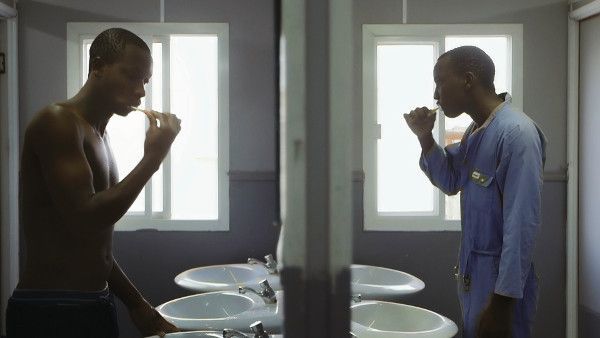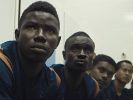Eye For Film >> Movies >> The Workers Cup (2017) Film Review
The Workers Cup
Reviewed by: Amber Wilkinson

Ever since Qatar won the right to host the World Cup in 2022, there has been talk about the poor conditions at the camps where the migrant workers to the oil-rich Gulf state - mostly from Africa, Asia and elsewhere in the Middle East - live as they build the stadiums. The numbers are enormous, with the migrant workforce of 1.6 million representing 60 per cent of the current Qatar populace. Director Adam Sobel spent several years producing films for news outlets, including the BBC, from the country and in his feature documentary debut, manages to get excellent access to one camp and its workers, to let them tell their own story.
Sobel blends the story of the workers' day-to-day lives with footage following one team's participation in The Workers Cup - or "workers welfare" cup - a tournament set up by the various contracting firms, with the teams playing by night in the stadiums they are building by day. The combination of the stories means that we are cheering on the men both in their matches and in their more everyday struggles.

Sobel doesn't invite us to pity these men but rather to listen to what they have to say. And there's certainly no self-pity in the mix. Ghanaian Kenneth, who becomes the captain of the Gulf Contracting Co team that the film follows, explains how he was duped into paying $1,500 to a recruiting agent who promised him that if he signed up to work in Qatar he would later be released to play at a club, but he doesn't see the fact this was a lie as a reason for soul searching. "People come here to fulfill their dreams," he says, matter of factly, "It's a risk I took."
The Gulf Contracting team are a culturally diverse band, with Kenyans, Nepalese and Indians also on the squad. Given that many of them work 12 hours a day, seven days a week despite being permitted a day off, the training and games represent a moment of camaraderie and escape from the daily drudge. Sobel's interviewees don't need to tell us about the cramped accommodation, which from above looks not dissimilar to a modern refugee camp. The men wash at long troughs and share rooms, with shoes outside a telling detail of the numbers involved. Also, because of the position of the camps - which tend to be in the middle of nowhere - and the need for permission to leave, there's very little for the workers to do, usually, except for work, eat and sleep.
Instead of asking his interviewees to explain what things are 'like', Sobel lets them tell their individual stories, which allows us to draw our own conclusions. Take the team's assistant captain Paul, from Kenya, for example, who has his heart set on a date with a Kenyan nanny also working in the country, but whose chances are considered slim by his workmates once his secret about the camps is out. Or Padam, from Nepal, who is unable to get a visa for his wife because he earns $400 per month, just a fraction of the $2700 needed to reach the eligibility threshold. "Ladies make the world move round," Paul declares, suggesting that life must move particularly slowly in an all-male camp. "I miss fish", one man says, just another of the little things that bring homesickness sharply into focus.
In one telling conversation about "freedom", one worker quotes Bob Marley and the need to "emancipate yourself from mental slavery", but their commitment to the company's team is never in short supply. When we see them on the pitch, they are determined to win, with their supporters doing their own bit to create chants and banners. It's here that we finally see the bosses - all white, of course - who tell them, "Don't worry, it's only a game," with no real concept of its importance to the players.
In addition to Sobel's thoughtful line of questioning, the film benefits from excellent editing from Sobel, Lauren, Wellbrock and Anne Jünemann, such as a cut from the pounding drills and dust of one of the building sites, to the equally rhythmic but tranquil sprinklers in downtown Doha. The film asks not for our sympathy but for understanding and calls on us to question the way these workers are being used not just for their labour but as a corporate marketing tool.
Reviewed on: 20 Jan 2017














